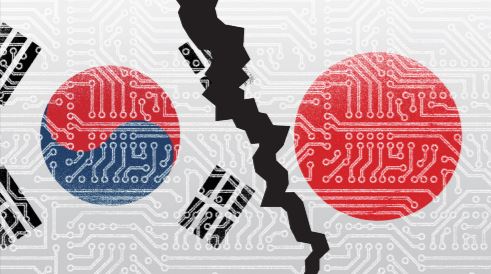
Shinzo Abe, Prime Minister of Japan, stated the joint declaration that connotes “promotion of free trade” at the G20 Osaka summit, on June 28th, 2019. After the summit, however, Japan initiated trade restrictions on the core industrial materials of South Korea, which has brought turmoil to the global economy. Thus, the Sungkyun Times (SKT) will discuss the background of the trade restrictions, how the situation has progressed, and the way both countries should proceed in the future.
Implementation of Trade Restrictions on South Korea
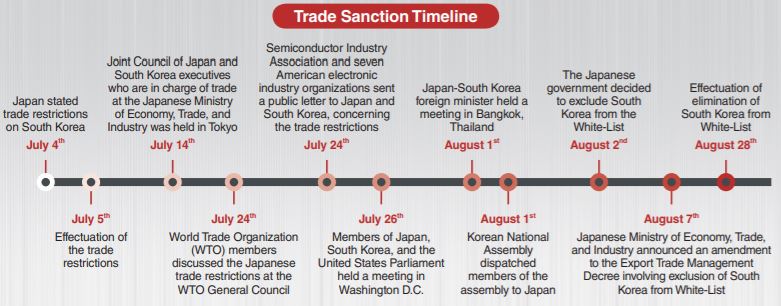
Japan and South Korea’s Perspectives Surrounding the Trade Sanction
1. The Perspective of Japanese National Security
Japan has pointed out that the current sanctions resulted from the insufficient export management of South Korea. The Japanese government announced that semiconductor materials have been sent to North Korea due to the inadequate export management of South Korea, and they were concerned that the materials might be used for the development of nuclear weapons. Thus, Japan is holding the stance that the current sanctions are at the level of national security so the discussion between Japan and South Korea is unnecessary. The sanction includes fluorinated polyimide, photoresist, and hydrogen fluoride. The first one is used to make smartphone displays and the others are for making semiconductors. Currently, Japan accounts for 92 percent and 94 percent of global photoresist and fluorinated polyimide supplies, respectively. At the same time, South Korea has a different perspective on the sanctions.
2. The Perspective of Retaliation of Compulsory Draft
Judgment After the trade restrictions, the Japanese Chief Cabinet Secretary, Yoshihide Suga, said: “South Korea failed to produce a satisfactory response to the wartime labor issue before the G20 summit, which severely damaged trust in the relationship.” It implies that the precedent judgment about the Japanese conscription by the Korean Supreme Court was a trigger for the trade restrictions. Japan has insisted that the claim for damages by victims individually should be ceased due to the Treaty on Basic Relations between Japan and South Korea. Turning to this logic, victims of a compulsory manpower draft were adjudged to have lost a lawsuit with the war criminal industry, Nippon Steel, at the Japanese Supreme Court in 2003. Conversely, the Korean Supreme Court decided that the victims won the lawsuit, according to the current International Human Rights Law which states that an individual claim for damages cannot be eliminated by an international treaty. The Japanese government said that if Japanese industries take damages due to the previous verdict, they will take proper action, such as economic retaliations. Therefore, after the exclusion of Korea from the White-List, the Korean government has defined that the Japanese trade restrictions are retaliation for the judgment of the Korean Supreme Court.
Progression of Trade Restrictions on South Korea Reactions in Korea
1. The Perspective of Government and Industries
The Korean government and Korean industries have announced new solutions. South Korea determined to cancel the General Security of Military Information Agreement (GSOMIA). It also has examined omitting Japan from the “Korean White-List”. Government-industry cooperation has been propelled by reducing the duration for licensing chemical materials on product research and development (R&D) and granting tax favors for the targets of the trade restrictions. Samsung Electronics and SK Hynix, which are the main targets of the trade sanctions, focus on localization and diversifying supply sources of core materials. Furthermore, the Korea-Japan business conference to improve JapanSouth Korea economic cooperation will be held in Seoul, September 24th. The conference has been held ceaselessly since 1969, however, it was postponed from May to September due to the uncomfortable atmosphere particularly this year. As a non-governmental institute, it is expected to contribute to the betterment of Korea-Japan relations.
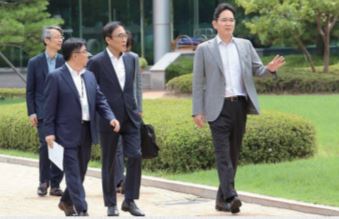
2. The Perspective of Civilians
After the Korea Federation Midsized and Small Merchant (KFSM) stated that it will participate in boycotts of Japanese products, these boycotts spread further across Korea. In research data released by Gallup Korea, responses saying “hesitating to buy Japanese products” took up 80 percent on July 25th. According to import trend data by the Korea Customs Service, the amount of Japanese beer imports dropped by 45.1 percent in July. Moreover, sales of Uniqlo, the Japanese brand of Specialty Store Retailer of Private Label Apparel (SPA), diminished by about 30 percent in July, while, TOPTEN, the Korean SPA brand, increased 20 percent over the same period. 680 civil society organizations held a candlelight vigil on August 3rd to criticize the Japanese trade sanctions around Gwanghwamun Plaza. It means civilians’ voices criticizing Japan are growing within Korean society.
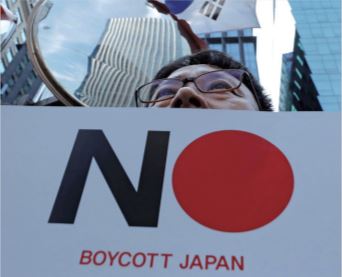
Reactions in Japan
Japanese semiconductor material industries have tried to expand production in Korea to avoid the trade sanctions. TOK Advanced Materials and Morita, which makes photoresist and hydrogen fluoride respectively are the examples. It is a movement of Japanese industries to prepare for diminishing sales due to the trade sanctions. Furthermore, Japanese civilians have held a rally opposing Abe in Shinjuku, Tokyo. After that, in front of the Korean YMCA in Tokyo, citizens held a candlelight vigil to criticize the current government. On the opposite side, simultaneously, the extreme right groups held a rally announcing a severance between Korea and Japan. On National Liberation Day of Korea, an anti-Abe rally was held in Osaka, which even had anti-Korean sentiment. Meanwhile, Shinzo Abe has repeated the same position, insisting that South Korea should take care of international treaties first. As the Japanese express their opinions regarding the current situation, there is expected to be an internal conflict in Japan.
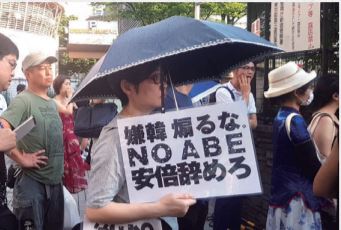
The Reactions from Other Countries
President Donald Trump of the United States (US), has taken a neutral position first, saying the US will mediate if both countries want. After that, Trump said the Korea-Japan dispute has made the US embarrassed and both countries have to get along with each other, in an interview on August 10th. It received attention because the US showed motion after South Korea referred to the destruction of the GSOMIA. Geng Shuang, the spokesperson of the Chinese Foreign Office, also pointed out the problem of unilateralism and protectionism and mentioned that the Chinese government supports Korea. In regards to the ongoing China-US trade dispute, the stance of China can be interpreted that it views the Japanese trade sanctions on Korea to be the same as the US trade sanctions on China.
The Way Both Countries Should Proceed
Why Should Korea and Japan Collaborate: Necessity from the Perspective of Economy Though the Korea-Japan relationship is mounting in tension now, economic collaboration cases in the past 10- years made by the Korea-Japan Economic Association show that the cooperative relationship between both countries leads to benefits for themselves. For example, in the case of Indonesia’s liquefied natural gas (LNG) development project, both countries have created a maximum synergy effect in the third world countries’ infrastructure construction business. South Korea could make the “Miracle on the Han River” by industrializing based on importing Japanese machine tools in the late 20th century. Japan also has had a lucrative time from the trade with South Korea since 1965. In other words, Korea and Japan have been in a symbiotic relationship in the economic field; Korea-Japan cooperation in tune with the times increases their competitiveness in a global society.
Normalization of Korea-Japan Relationship Through Constant Non-governmental Interchange
The Korea-Japan dispute resulted from different perspectives regarding past affairs. Therefore, the norminalization of the relationship should be the first to draw cooperation. Both countries agree on the necessity of mutual comprehension and cooperation. Regarding this status, according to Cho Hui-yong, a manager of the Korea National Diplomatic Academy, private interchange might indeed contribute to a deepening mutual understanding. Treating current political affairs with deepened mutual understanding by non-governmental interchange may be a fundamental solution to soothe the tension in both countries. Taking the current situation as an opportunity, turning the anti-Korean and anti-Japan sentiment into peaceful sentiment may be a public assignment for all of the current generations.
The global economy has maintained dynamic conditions under the order of “free trade”. In the second half of the year, however, global trade order has been weakened due to consecutive trade disputes. If this tendency prevails, the global economy will be inelastic and fall into depression. The present condition is quite similar to the warring states period. The SKT expects Kingos to have the right perspective and act properly at their discretion through this article.
